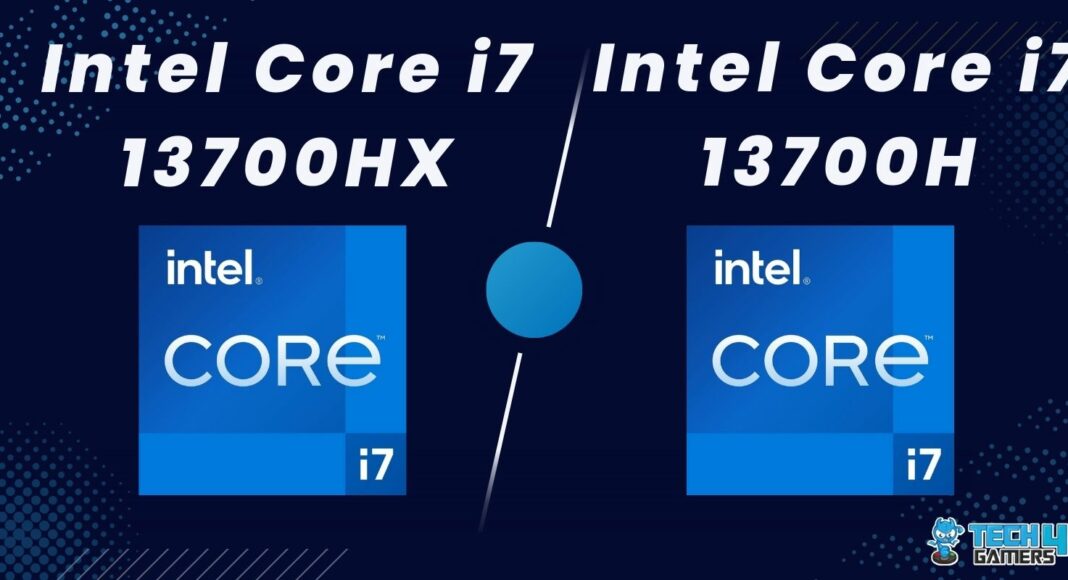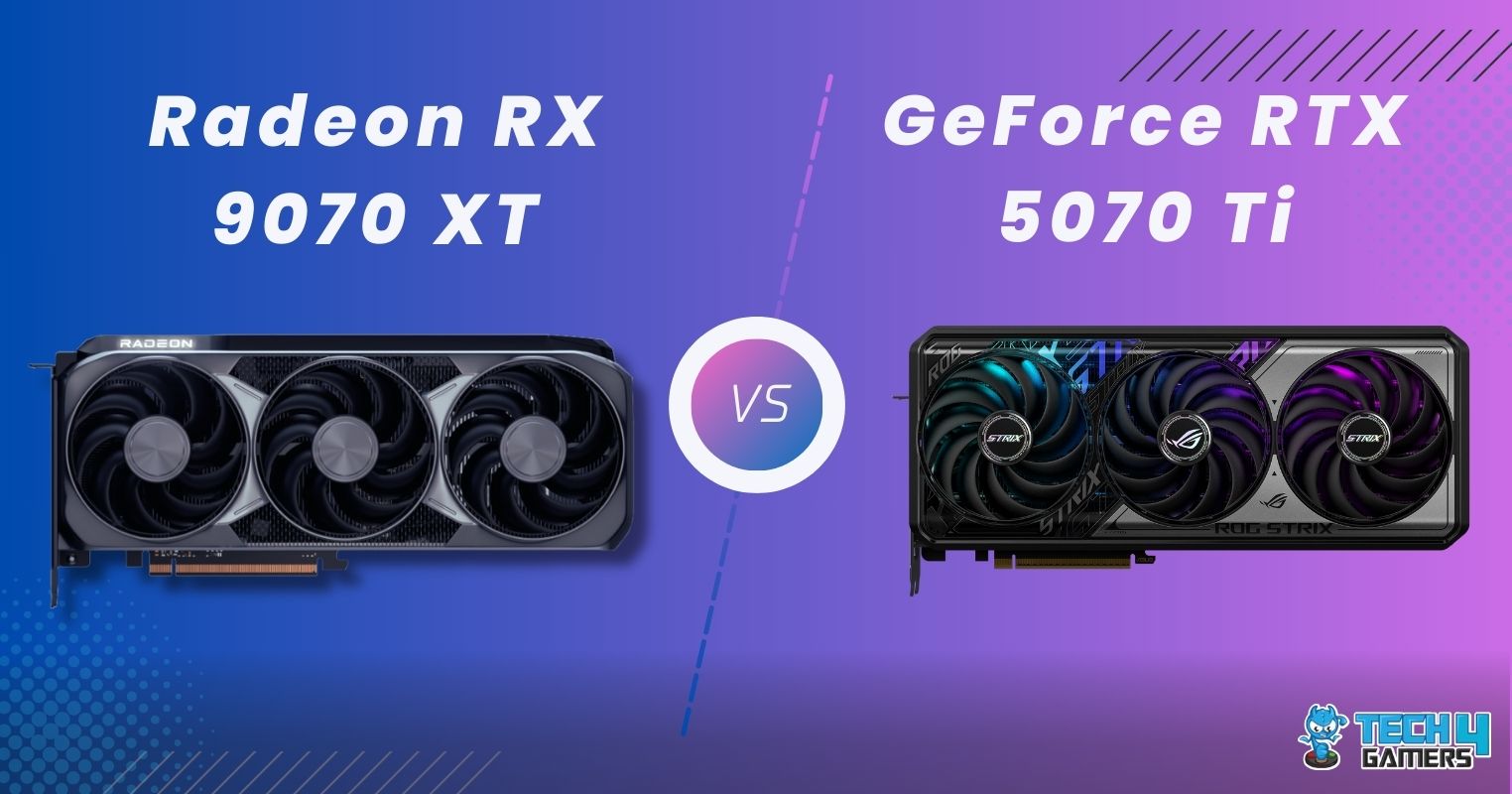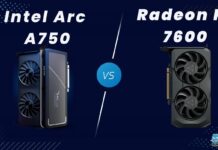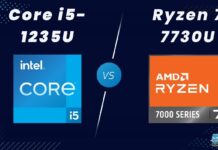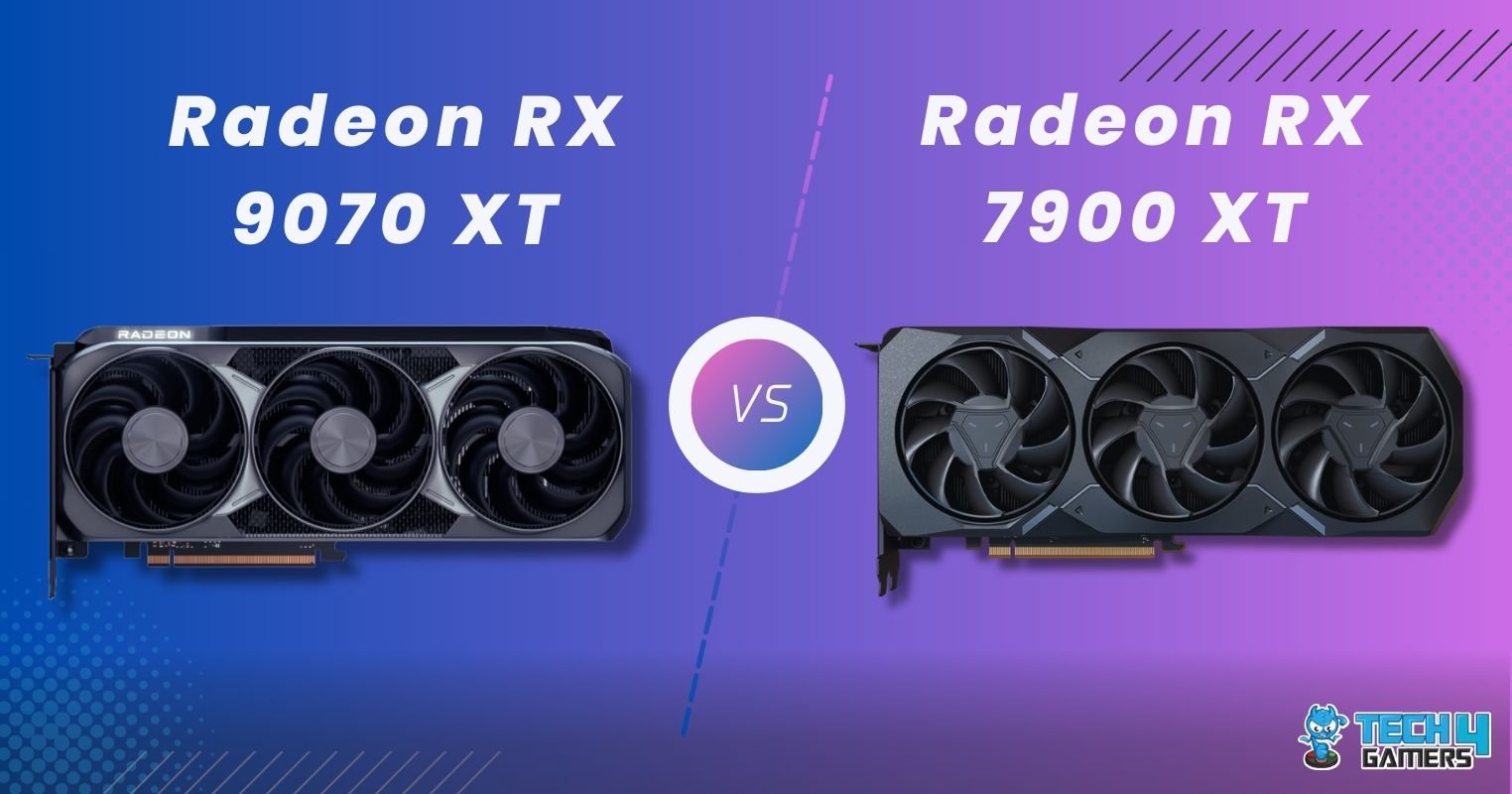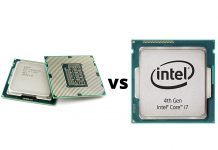Intel Core i7 13700HX
Rated: 9/10
Intel Core i7 13700H
Rated: 7.5/10
Pros And Cons
| CPU | Pros | Cons |
|---|---|---|
| Core i7 13700HX | ✅ Better Performance ✅ Better Memory | ❌ Higher TDP ❌ Pricey |
| Core i7 13700H | ✅ Lower TDP ✅ Lower Price | ❌Lower Memory Support ❌ECC Support Unavailable |
- We found that the Core i7 13700HX boasts a slight 1.6% lead in single-core benchmarks, making it an ideal choice for users who prioritize quick execution of individual tasks and applications.
- With a substantial 26.8% advantage in multi-core benchmarks, the Core i7 13700HX stands out in our opinion as the go-to option for handling resource-intensive workloads and multitasking scenarios.
- While both processors offer configurable TDPs, the Core i7 13700HX presents a slightly wider range of 45-55W, offering users the freedom to fine-tune their system’s performance and power efficiency
- The Core i7 13700HX excels in memory-intensive applications due to its 128GB memory. We would recommend this processor as its support for ECC memory also ensures heightened accuracy as well.
Comparison Table
| Key Specifications | Core i7 13700HX | Core i7 13700H |
|---|---|---|
| Release Date | January 3, 2023 | January 3, 2023 |
| Device Type | Laptop | Laptop |
| Integrated GPU | UHD Graphics (32EU) | Iris Xe Graphics (96 EU) |
| Performance Cores | 8 | 6 |
| Performance Threads | 16 | 12 |
| Total Cores | 16 | 14 |
| Total Threads | 24 | 20 |
| L1 Cache | 80K (per core) | 80K (per core) |
| L2 Cache | 2MB (per core) | 2MB (per core) |
| L3 Cache | 30MB (shared) | 24MB (shared) |
| Socket | BGA-1964 | BGA-1744 |
| Cuda Cores | 256 | 768 |
| Execution Units | 32 | 96 |
Architectural Differences
- Process Node: Firstly, while both the Core i7 13700HX and Core i7 13700H share a 10nm process node, their performance implications vary due to other architectural factors.
- Clock Speed: Furthermore, the Core i7 13700HX features a Base Clock of 2.1 GHz and a Boost Clock of 5 GHz, offering competitive performance. In comparison, the Core i7 13700H operates with a slightly higher Base Clock of 2.4 GHz and the same Boost Clock of 5 GHz, potentially influencing its efficiency.
- Memory Support Variation: The Core i7 13700HX provides an expansive memory capacity of up to 128GB, catering to memory-intensive tasks. On the other hand, the Core i7 13700H supports up to 64GB.
- TDP: While the Core i7 13700HX and Core i7 13700H both offer configurable TDPs for power management, the former comes with a range of 45-55W, potentially providing more headroom for applications, whereas the latter offers a range of 35-45W.
- Supported Technologies: The Core i7 13700HX stands out with its support for ECC memory, a valuable feature for enhanced error correction in critical computing tasks. However, the Core i7 13700H lacks this technology.
In the realm of high-performance computing, the battle between processors is a constant evolution driven by innovation and engineering prowess. In this comparative analysis, we delve into the intriguing showdown between Intel’s Core i7 13700HX vs Core i7 13700H, dissecting their specifications and unveiling their performance benchmarks.
Performance Benchmarks
Let’s shift our focus to the performance benchmarks, where real-world scenarios and synthetic tests will shed light on how these architectural disparities translate into tangible computing power. By analyzing their performance across multiple benchmarks, we can comprehensively understand how these chips stack up against each other.
Cinebench R23 (Single-Core)
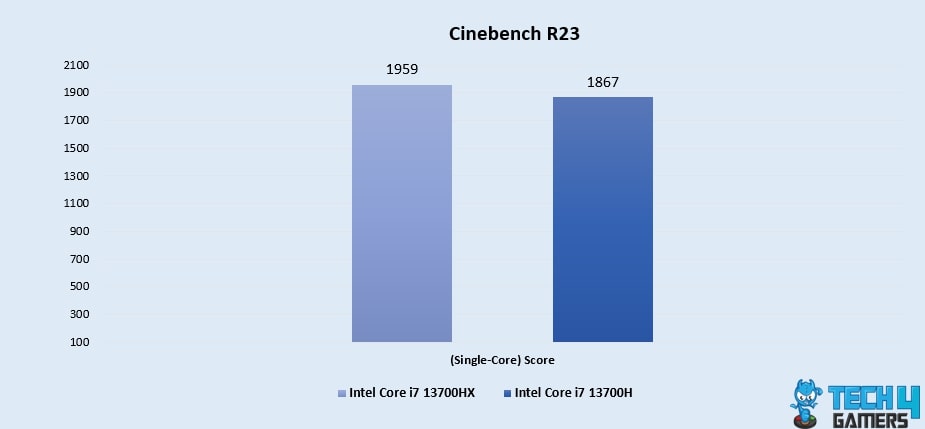
- During our Cinebench benchmarks, the Core i7 13700HX boasts a 4.8% lead over the Core i7 13700H, with scores of 1959 and 1867, respectively. This performance differential indicates the Core i7 13700HX’s potential for swift and efficient execution of single-core tasks.
Cinebench R23 (Multi-Core)
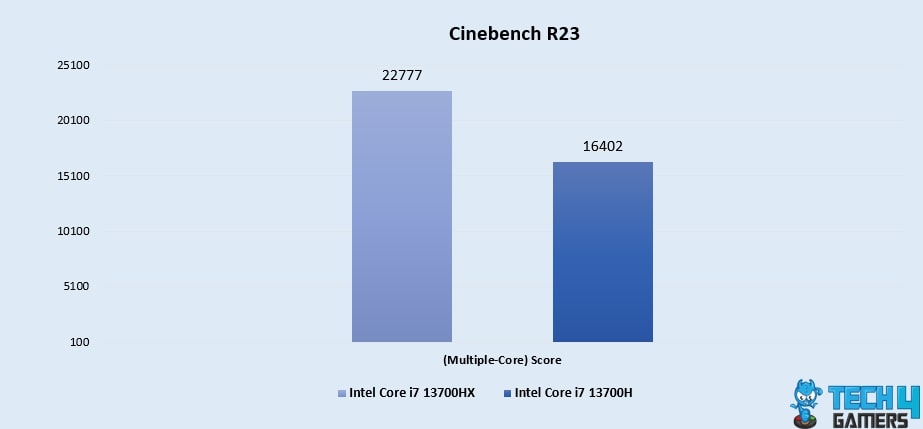
- In our comparison’s multi-core performance, the Core i7 13700HX takes a substantial 32.5% lead, achieving scores of 22777 compared to the Core i7 13700H’s 16402. This advantage highlights the Core i7 13700HX’s efficiency in managing demanding workloads.
Geekbench 5 (Single-Core)
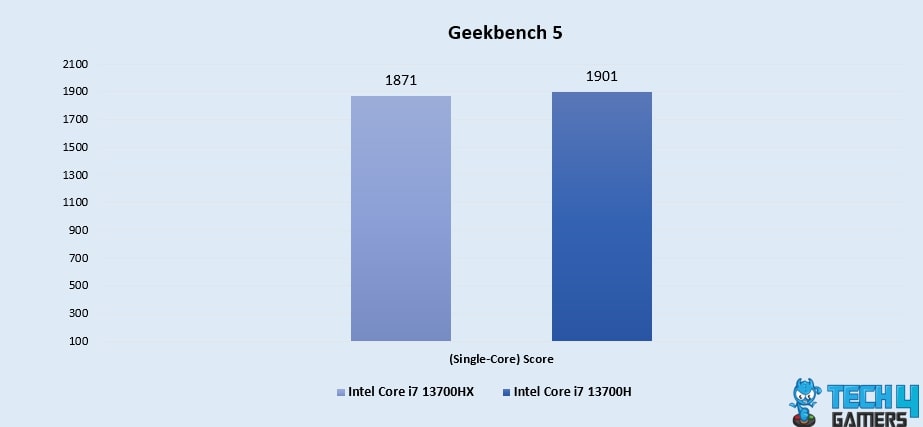
- With a 1.5% lead in single-core benchmarks, the Core i7 13700H achieves a score of 1901, slightly trailing behind the Core i7 13700HX’s score of 1871. This nuanced difference in this benchmark indicates varying single-threaded processing capabilities.
Geekbench 5 (Multi-Core)
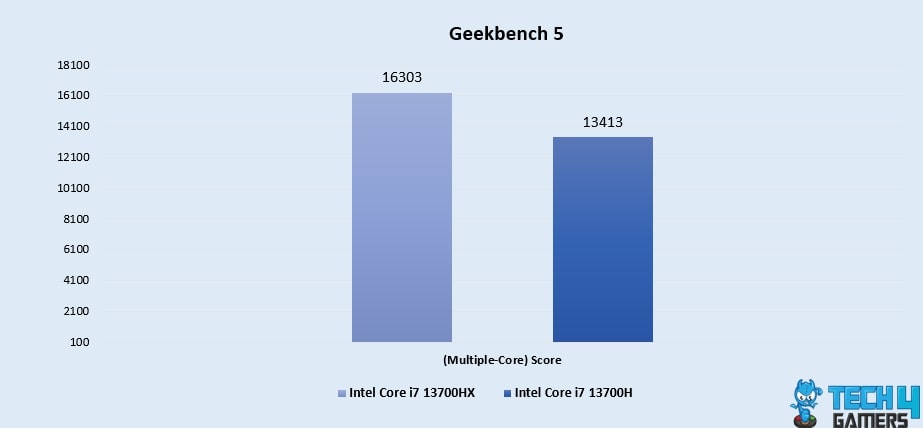
- Finally, the Core i7 13700HX maintains a notable 19.4% lead in multi-core benchmarks, scoring 16303, while the Core i7 13700H achieves 13413. This distinction underscores the Core i7 13700HX’s proficiency in handling complex multi-threaded tasks.
Core i7 13700H Vs Core i7 13700HX: Which One Should You Go For?
Core i7 13700HX: Considering the Core i7 13700HX, we saw that it holds a slight 1.6% advantage in single-core benchmarks and a 26.8% lead in multicore benchmarks, showcasing its capability for efficient execution of individual tasks and applications as well as resource-intensive workloads and multitasking scenarios, ensuring smoother performance.
Intel Core i7 13700H: While both chips offer configurable TDPs, we analyzed that the Core i7 13700H features a 10W lower TDP range as compared to the Core i7 13700HX. This adaptability allows users to prioritize performance or power efficiency in our opinion.
We would recommend you opt for the Intel i7 13700HX as it provides exceptional single-core and multicore performance compared to its rivals and provides added features like ECC memory support which provides enhanced memory support to the consumers.
More From Intel Core i7 13700H:
More From Intel Core i7 13700HX:
- Core i7 13700HX Vs Ryzen 7 7745HX
- Core i7 13700HX Vs Core i7 13700H
- Core i7 13700H Vs Ryzen 7 7840HS
Thank you! Please share your positive feedback. 🔋
How could we improve this post? Please Help us. 😔
[Comparisons Expert]
Shehryar Khan, a seasoned PC hardware expert, brings over three years of extensive experience and a deep passion for the world of technology. With a love for building PCs and a genuine enthusiasm for exploring the latest advancements in components, his expertise shines through his work and dedication towards this field. Currently, Shehryar is rocking a custom loop setup for his built.
Get In Touch: shehryar@tech4gamers.com


